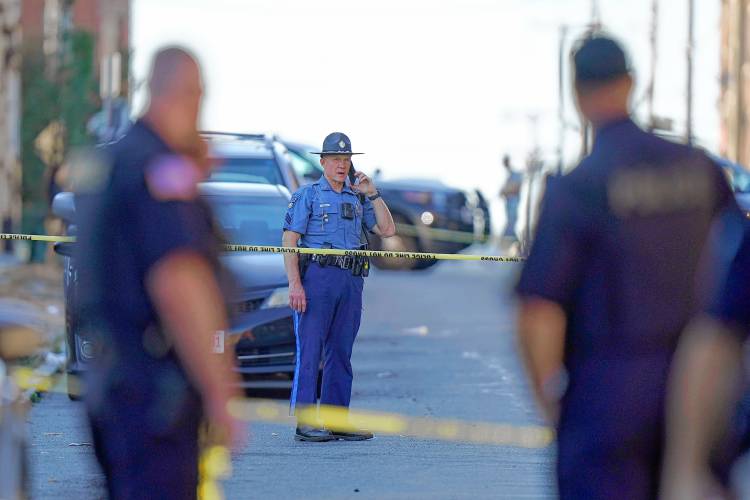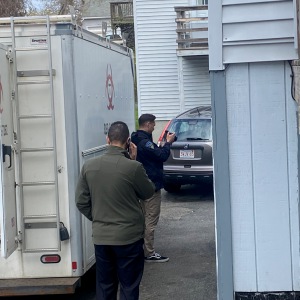Police hiring, retention a ‘major issue’ in Massachusetts

Members of law enforcement stand near police tape while investigating the scene where multiple people were shot in Holyoke in October 2023. AP PHOTO/STEVEN SENNE
|
Published: 03-25-2024 5:24 PM
Modified: 03-26-2024 8:44 AM |
Public Safety and Security Secretary Terrence Reidy recently warned lawmakers that big cities and small towns face a “major issue” with recruiting new candidates for law enforcement jobs, and local police chiefs say Franklin County is no exception.
Greenfield acting Police Chief Todd Dodge and Montague Police Chief Christopher Williams echoed the sentiments Reidy shared during a fiscal year 2025 budget hearing and said the public’s increasingly negative perception of police officers is perhaps the biggest contributing factor to this trend.
“I don’t think there’s any secret,” Dodge said on Monday. “The national, if not global, narrative is that we’re not honest, that we’re abusive. If you know the men and women of the Greenfield Police Department, they’re anything but that.”
Dodge said he was his department’s Civil Service liaison several years ago and he fondly remembers a time when a job opening produced dozens of candidates residing in Greenfield, plus thousands more from outside this small city. He mentioned there were only six applicants for the department’s most recent opening. Civil Service is the state’s merit-based hiring system for filling public safety positions, according to the Massachusetts Municipal Association. But Greenfield and Montague have left the system.
Dodge said his department will again be put to the test as it works to fill the lieutenant position he left empty when he became acting chief following the retirement of Chief Robert Haigh Jr., who resigned last month. Dodge also mentioned some officers plan to retire by the end of the next fiscal year and he recently learned Officer Ella Sinigur will leave for a State Police trooper position on April 3.
The acting chief said police officers everywhere have to re-establish faith and trust.
“That’s what people pay us for, to keep people safe,” Dodge said. “We have no ulterior motives.”
A big step, Dodge continued, would be having a police department that reflects the demographics of the community it polices.
Article continues after...
Yesterday's Most Read Articles
“I want everybody to believe this is a job for them,” he said.
Christopher Williams, who has been Montague’s police chief for 5½ years, has not previously had difficulty filling open positions but he said that may soon change. Williams must replace Sgt. John Dempsey, who retired in December, and this will be the department’s first hire since the town left the Civil Service system.
“I don’t know if someone’s going to fall into my lap that’s already trained or if I’ll have to send someone to the academy,” Williams said. “I’m hoping it will be easier, because I’m hoping to draw someone who’s already been trained.”
He noted the entire state “is my pool of applicants — not just a Civil Service list.”
Williams also said it would help if the state Legislature allowed more municipalities out of Civil Service.
“Fewer and fewer people are taking the test to become a police officer,” Williams said, adding that the younger generation has a negative view of law enforcement. “Everybody is having a hard time, throughout the whole state, hiring people.”
The chief said he expects the Franklin County Police Cadet Program, which is set to officially launch later this spring, will help bridge the gap between young people and law enforcement. The program is open to students ages 13 to 21 who are interested in careers in criminal justice. Cadets will attend weekly meetings at Greenfield Community College from 6:30 to 8:30 p.m. on Wednesdays. There also will be trips to police stations and other agencies within law enforcement.
Scott Hovsepian, president of the 5,000-member Massachusetts Coalition of Police, said MassCOP is supporting recruitment efforts and “providing tools and benefits that help attract more people into policing.”
“We certainly share Secretary Reidy’s concern about the lower volume of men and women entering or even exploring the law enforcement profession,” Hovsepian told State House News Service. “Gov. Healey has also expressed concern to us directly with this trend. We appreciate that the administration is prioritizing solutions.”
State Police is feeling the pinch from a dearth of graduates from its academy training program from 2006 through 2012, State Police Association of Massachusetts President Brian Williams said.
Hiring efforts also are stymied by the 2008 loss of an education pay incentive, which previously gave state troopers a salary hike as they earned certain degrees. Some local police departments do provide that incentive, and some in the Greater Boston area offer a base pay that can be 25% higher than that of the State Police, according to Brian Williams and SPAM spokesperson Chris Keohan.
With those discrepancies, Brian Williams said it would be an easy decision to join a municipal police department over the State Police.
“If we don’t have the number to staff appropriately, then there’s not going to be enough troopers on the road to respond to crashes or other critical incidents that occur every day,” he said. “Members are being forced to work additional shifts, missing holidays, missing family events. It affects personal lives, it affects the morale.”
The State Police has about 2,300 sworn members, though the goal is to get that number above 3,000, according to Col. John Mawn. The force hovered near 2,000 at this point last year, he said.
Mawn said retaining State Police members is not an issue, but he noted the workforce is “very mature.”
“I don’t have the figure in front of me, but if everybody that could go decided to go, we’d be going backwards quite a bit,” Mawn said.
The State Police has been under Mawn’s leadership since February 2023. Gov. Maura Healey tapped Mawn to serve as interim superintendent and has not yet named a more permanent leader for the force. The Executive Office of Public Safety and Security told State House News Service in mid-January that interviews with the most qualified candidates were to begin soon.
Rep. Todd Smola, a Warren Republican, had asked for Reidy’s input on expanding the municipal police workforce, particularly in rural towns where small departments are more acutely feeling the strain of vacant positions.
Smola noted that being down just one police officer could translate into a 10% to 20% loss in a police department in central or western Massachusetts. He acknowledged that law enforcement “in so many arenas seems to be vilified.”
“When police chiefs are offering big signing bonuses, big incentives to come on board, and they’re still not getting the qualified individuals to apply for these positions, this is a huge problem,” Smola said.
Police chiefs are also struggling to make internal promotions, as they lack employees who have enough years of experience to move up the chain of command, Smola said.
“That’s another serious problem that we’re hearing from a lot of different pockets of local police departments,” Smola said. “I’d just love to get your feedback in general on that, and how we as a Legislature can kind of focus in with laser-like precision on trying to figure out how our municipal police departments are well-prepared to be able to go after good qualified individuals, and to be able to keep them around for a while so that they can make sure that they have a full complement on their local departments.”
Hovsepian, whose group has officers in 181 communities, tied law enforcement labor woes back to the heated debate that led to a law targeting policing practices, instituting a police certification process and enacting other justice system reforms.
“It should come as no surprise to anyone on Beacon Hill, however, that so many talented men and women have been dissuaded from pursuing public service careers as officers,” Hovsepian said. “The hostile, anti-police rhetoric [that] accompanied the debate over law enforcement reform in Massachusetts inflicted permanent damage.”

 What are the protocols for emergency transport of infants?
What are the protocols for emergency transport of infants? State records show Northfield EMS chief’s paramedic license suspended over failure to transport infant
State records show Northfield EMS chief’s paramedic license suspended over failure to transport infant Authorities ID victim in Greenfield slaying
Authorities ID victim in Greenfield slaying  Frontier Regional School students appeal to lower voting age
Frontier Regional School students appeal to lower voting age
